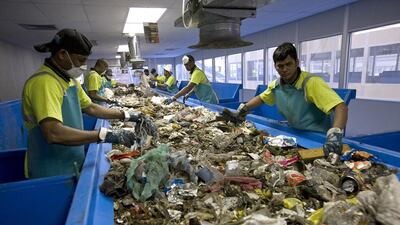ABU DHABI // The UAE cannot succeed in recycling until its residents assume the responsibility or are pressured into it by Government regulations and incentives, experts have said.
Organisations in the country have acknowledged the problem and some have begun to implement plans to improve their infrastructure.
Tadweer recently announced a plan that will shift Abu Dhabi's entire waste management system to focus on recycling. However, without stringent resident participation and government follow-up it may well be for naught.
Even if the latest technology and best practices are implemented, the second a resident throws a non-recyclable item in a “green bin” the entire process becomes futile.
Ordinary rubbish contaminates recyclables, “which are thrown into the lorry and contaminate the lorry and lowers the value of the entire recycling process”, said Fehily Timoney, managing director of an Irish environmental consultancy working with Tadweer.
Mr Timoney said many people did not realise the costs involved with poor recycling. Every action in the disposal process has a cost – financial and to the environment.
“From the moment I employ a man to turn on an engine [of a vehicle] that will go to pick up recyclables, that’s the moment the ticker starts,” said Stuart Fleming, chief executive of Enviroserve, a local company that recycles electronics.
“Those are costs we have to take into account. Then you have the cost of employing people to sift through the waste.”
Mr Fleming said recycling was not only about monetary costs but also carbon footprints, which can be reduced with improved facilities and efficiency but if done poorly, the effort can be detrimental.
“We need people to take into account the amount it costs companies and the environment to produce this waste,” said Nidaa Al Ahmadi from Bee’ah, Sharjah’s waste-management company.
“Without their help we can’t exactly be efficient. That’s why more awareness is needed.”
Contaminated recyclables upset the process, requiring companies to hire people to separate waste.
The consumer must take into account the collection service that the Government has implemented to encourage recycling.
Some countries have one collection point for a group of residences as opposed to a bin for each house. This is to cut the cost of lorries having to drive to each house to pick up rubbish.
In some areas it is house-by-house collection.
“Our master plan doesn’t move forward, our work doesn’t work without educating the people in the schools and the houses and the workforces,” said Issa Al Qubaisi, general manager of Tadweer.
“They need to work with us for us to succeed.
“We can put in the best facilities but it’s the people that need to also join us.”
nalwasmi@thenational.ae

